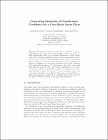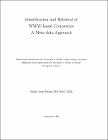Browsing Computer Science Technical Reports by Title
Now showing items 112-131 of 280
-
FacetS: First Class Entities for an Open Dynamic AOP Language
(Trinity College Dublin, Department of Computer Science, 2006)This paper describes a new aspect language construct for Squeak, named FACETS. Aspects are completely integrated within the Squeak programming language and its environment. The innovations of FACETS are: (i) traits can ... -
Feature Extraction for Classification in Knowledge
(Trinity College Dublin, Department of Computer Science, 2003)Dimensionality reduction is a very important step in the data mining process. In this paper, we consider feature extraction for classification tasks as a technique to overcome problems occurring because of ?the curse ... -
Feature Extraction for Dynamic Integration of Classifiers
(Trinity College Dublin, Department of Computer Science, 2006)Recent research has shown the integration of multiple classifiers to be one of the most important directions in machine learning and data mining. In this paper, we present an algorithm for the dynamic integration of ... -
Feature Extraction for Spam Classification
(Trinity College Dublin. Department of Computer Science, 2004-09)E-mail has emerged as one of the primary means of communication used in the world today. Its rapid adoption has left it ripe for misuse and abuse. This came in the guise of Unsolicited Commercial E-mail (UCE) or as it is ... -
The Federated Event Service
(Trinity College Dublin. Department of Computer Science, 2003-09)Event services provide asynchronous, decoupled, anonymous message-based communication. This facilitates scalable distributed systems composed of autonomous concurrently executing entities. There are several kinds of event ... -
A first taste of Vanilla
(Trinity College Dublin, Department of Computer Science, 1998-09-29)We present an overview of Vanilla, a system for building interpreters from components implementing language fragments. We describe Vanilla?s architecture and capabilities, and illustrate its use by defining a simple ... -
A Flexible, Scalable, Distributed, Fault Tolerant Architecture for the Collection and Dissemination of Multimodal Traffic-Related Information
(Trinity College Dublin. Department of Computer Science, 2003-09)Intelligent Transportation Systems (ITS) produce considerable quantities of dynamic data. ITS endusers will require wide, rich and highly available services which will involve processing and disseminating large amount ... -
A Framework for Academic Electronic Journal Publications
(Trinity College Dublin. Department of Computer Science, 2003-09)Academic journals are the backbone of scholarly communication and the preservation of knowledge. For years they have served as a record of progression and an archive of academic debate. They are the medium through which ... -
Gaining Insight through Case-Based Explanation
(Trinity College Dublin, Department of Computer Science, 2004-12)Because CBR is an interpretable process, it is a reasoning mechanism that supports explanation. This can be done explicitly by the system designers incorporating explanation patterns in cases. This can be termed knowl ... -
Generalised Syntactic Pattern Recognition as a Unifying Approach in Image Analysis
(Trinity College Dublin, Department of Computer Science, 1998-08)In this paper we analyse theoretical foundations of syntactic pattern recognition and its relationships with mathematical linguistics, structural pattern recognition, and statistical pattern recognition. We point out ... -
Generating Estimates of Classification Confidence for a Case-Based Spam Filter
(Trinity College Dublin, Department of Computer Science, 2005-02-05)Producing estimates of classification confidence is surprisingly difficult. One might expect that classifiers that can produce numeric classification scores (e.g. k-Nearest Neighbour or Naive Bayes) could readily produce ... -
A Generic Architecture to Control Jini Services over the Internet
(Trinity College Dublin. Department of Computer Science, 2001-09)Distributed computer systems have brought many advantages over traditional centralised systems. However these systems have innate complications such as partial failure, lack of system wide knowledge, concurrency etc. ... -
Hierarchical Case-Based Reasoning: Integrating Case-Based and Decompositional Problem-Solving Techniques for Plant-Control Software Design
(Trinity College Dublin, Department of Computer Science, 1997)Case-based reasoning (CBR) is an AI technique that emphasises the role of past experience during future problem solving. New problems are solved by retrieving and adapting the solutions to similar problems, solutions ... -
Hierarchical CBR for Multiple Aircraft Conflict Resolution in Air Traffic Control
(Trinity College Dublin, Department of Computer Science, 1998-07)In this paper we present a Case-Based Reasoning system that helps air traffic controllers to solve aircraft conflicts. In particular, we focus on the hierarchical aspect of the CBR system which is able to solve multiple ... -
HOUSe-KEEPER, A Vendor-independent Architecture for Easy Management of Smart Homes
(Trinity College Dublin. Department of Computer Science, 2001-09)Home-networking is gaining momentum. In a couple of months, Windows XP will be launched with the connected home experience as one of its core areas of interest. In the medium term at least, there will be more than one home ... -
Identification and Retrieval of WWW-based Courseware: A Metadata Approach
(Trinity College Dublin. Department of Computer Science, 1999-09)Information retrieval is often a tedious and time consuming task on the Internet, as information is stored in an unstructured manner. There is no guarantee that what you find is relevant to your needs, on the correct topics, ... -
An Implementation and Evaluation of the Ad-hoc On-demand Distance Vector Routing Protocol for Windows CE
(Trinity College Dublin. Department of Computer Science, 2003-09)There are a number of implementations of the Ad-hoc On-demand Distance Vector (AODV) routing protocol available for the Linux platform, but not for any other platform. Development of ad-hoc routing protocols has been slow ... -
An Implementation of a Parasitic Routing Algorithm
(Trinity College Dublin. Department of Computer Science, 2004-09)Portable personal computers with low-power requirements are fast becoming a necessity as access to up to date information is required by users no matter what their location. Unfortunately the ability to deliver this ... -
Implementation of SAMPLE Protocol
(Trinity College Dublin. Department of Computer Science, 2005-09)Wireless networks are pervasive in our society. With an increased interest shown by the general public in wireless technologies, protocols and hardware are being actively developed by academic and industrial groups alike. ... -
Implementing an Integrated Web-Based Synchronous eLearning Collaboration Platform at Tertiary Level for Part-Time Mature Evening Students
(Trinity College Dublin. Department of Computer Science, 2005-10)This thesis focuses on the lessons learned and new insights gained, from the pilot implementation of a webbased synchronous eLearning collaboration platform at Tertiary Level evaluated on part-time mature evening students. Over ...























